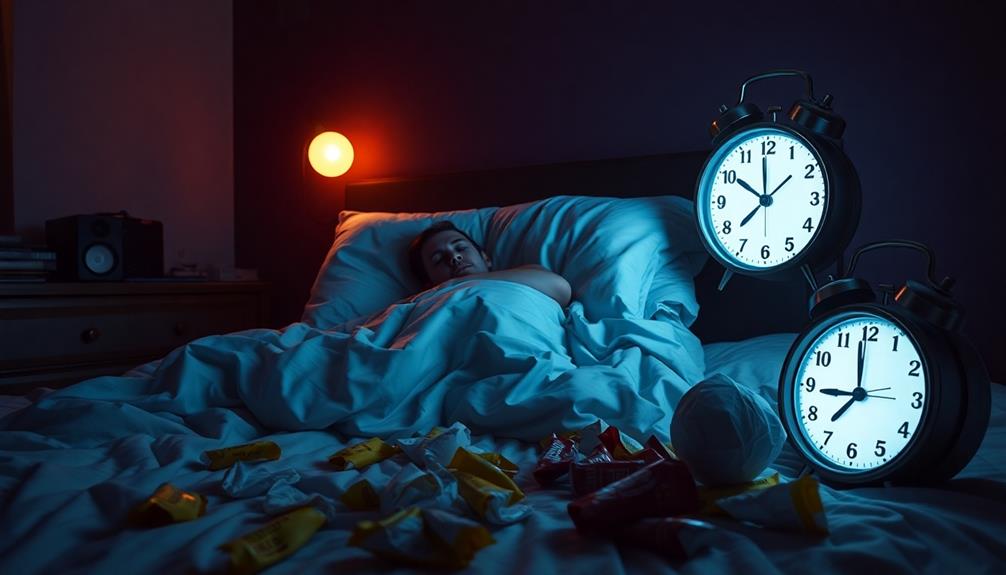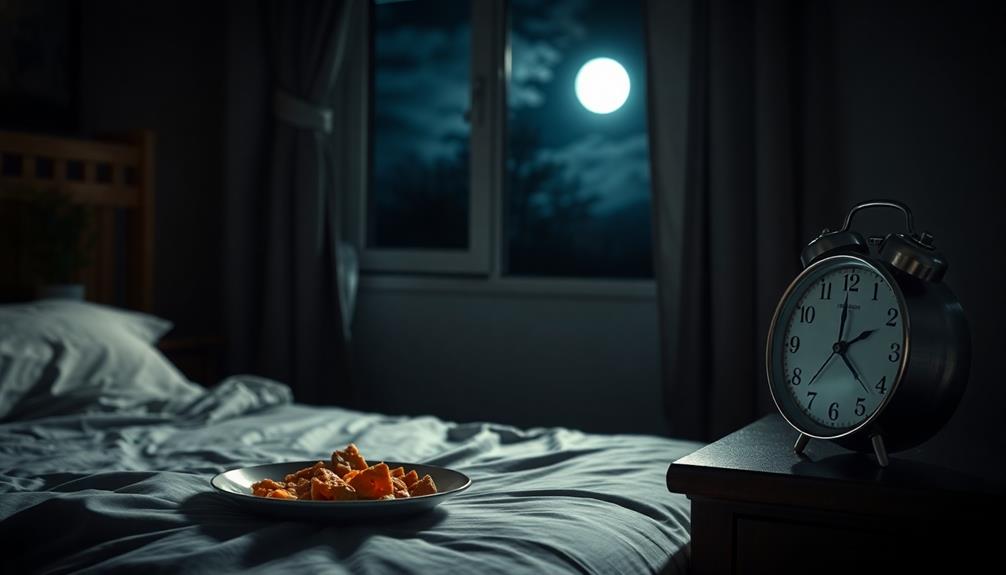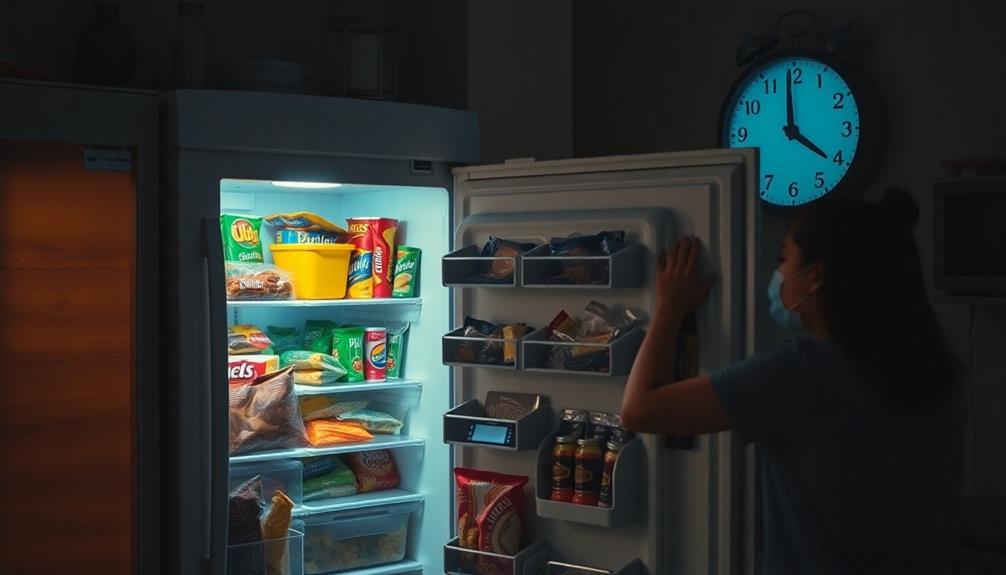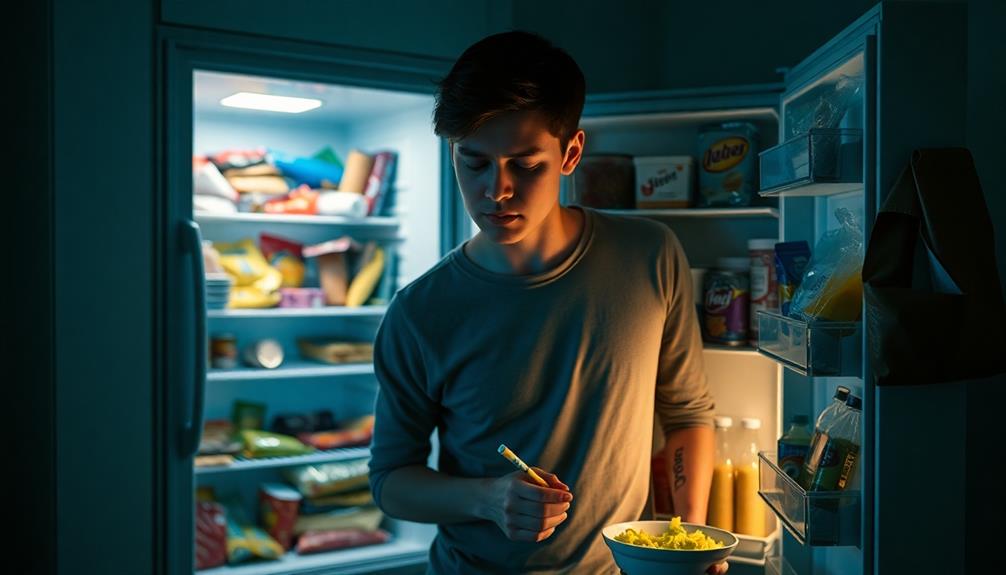Sleep deprivation messes with your eating habits, making you feel hungrier and changing your cravings. When you're sleep-deprived, your body produces more ghrelin, which stimulates appetite, while leptin, the hormone that signals fullness, decreases. This hormonal shift leads to cravings for high-calorie and unhealthy foods, especially comfort items. You might find yourself reaching for snacks late in the day, even if you don't feel particularly hungry. This cycle can also contribute to weight gain and metabolic issues over time. Understanding these effects can help you make better choices for both your sleep and diet.
Key Takeaways
- Sleep deprivation disrupts appetite-regulating hormones, increasing ghrelin and decreasing leptin, leading to heightened hunger and cravings for unhealthy foods.
- Individuals experiencing sleep loss often consume nearly 300 extra calories daily, with a significant rise in fat intake.
- Emotional eating becomes more prevalent, with cravings for high-calorie comfort foods intensifying due to fatigue and stress.
- Sleep deprivation increases the likelihood of choosing calorie-dense snacks, driven by hormonal changes and increased pleasure from eating.
- Chronic sleep loss contributes to obesity risks, as persistent cravings for high-calorie foods lead to unhealthy eating habits over time.
Overview of Sleep Deprivation

Sleep deprivation creeps in when you consistently get less rest than your body needs, leaving you feeling tired and unfocused. This lack of sleep disrupts the balance of appetite-regulating hormones in your body, specifically increasing ghrelin and decreasing leptin. As a result, you experience heightened feelings of hunger, making it harder to resist those late-night snacks.
Notably, cravings for certain foods, such as rich and flavorful dishes like Mushroom Masala, can intensify during periods of sleep deprivation. Research shows that when you're sleep-deprived, your caloric intake can increase by over 300 calories, particularly from high-fat foods. You might find yourself reaching for those indulgent treats more often, especially in the late afternoon and evening when the effects of sleep deprivation hit hardest.
Additionally, the endocannabinoid 2-AG rises by 33%, enhancing the pleasure you get from eating and pushing you toward less nutritious food choices.
Chronic sleep deprivation can set the stage for obesity and metabolic disorders, as studies link insufficient sleep to unhealthy dietary patterns. Understanding how sleep deprivation affects your eating habits is essential, as it directly impacts your overall health and well-being.
Prioritizing quality sleep can help restore balance and lead to healthier food choices.
Hormonal Changes and Appetite

When you're short on sleep, hormonal changes can greatly impact your appetite. Sleep deprivation leads to increased ghrelin levels, the hormone that stimulates hunger, while decreasing leptin levels, which normally curb appetite. This imbalance can heighten your overall appetite, making you crave food more than usual.
Research shows that you might experience a 33% rise in endocannabinoid 2-AG levels, enhancing the pleasure of eating and driving your appetite even further. Additionally, cravings for rich and indulgent foods, reminiscent of the diverse flavors found in Brazilian cuisine, may become more pronounced during periods of sleep loss.
Chronic sleep loss is linked to a significant increase in caloric intake, with many consuming nearly double the amount of fat and exceeding their daily calorie needs by over 300 calories, despite having lower energy requirements.
These hormonal changes also impair the regulation of appetite hormones, leading to a stronger desire for high-calorie foods, particularly in the late afternoon and evening.
Moreover, studies indicate that these disruptions correlate with unhealthy dietary choices and an increased body mass index (BMI). Poor sleep quality not only affects your appetite but can also contribute to obesity and metabolic disorders.
Understanding these hormonal changes can help you make better choices when you're feeling sleep-deprived.
Psychological Impacts on Eating

When you're sleep-deprived, cravings for unhealthy foods can take over, making it harder to stick to nutritious choices.
This can lead to a preference for richer, more indulgent dishes, such as Nettle and Potato Soup, instead of lighter options that might be more beneficial for your overall health.
The stress from lack of sleep can trigger emotional eating, leading you to reach for comfort foods instead of healthier options.
This cycle not only affects your appetite but also complicates your ability to make sound food decisions.
Cravings and Food Choices
Lack of sleep can dramatically skew your cravings, pushing you toward high-calorie snacks that mightn't even align with your usual preferences. For instance, you might find yourself longing for rich and savory dishes like Red-Braised Pork Belly, even if they aren't typically your go-to.
Sleep deprivation greatly alters your appetite, leading to an increased desire for unhealthy foods. Research shows that when you're sleep-restricted, your fat intake can nearly double compared to when you're well-rested. This isn't just about feeling hungry; it's a psychological impact that influences your food choices.
The endocannabinoid system, which plays a role in pleasure derived from eating, is affected by sleep loss. Elevated levels of 2-AG enhance your cravings for high-calorie foods, even if your self-reported hunger levels remain similar. This means that despite not feeling hungrier, you crave more unhealthy options.
Chronic sleep deprivation can lead to persistent changes in your dietary preferences, making it easier to fall into unhealthy eating habits. Over time, this can increase your risk of obesity and metabolic disorders.
Emotional Eating Triggers
Emotional eating often emerges as a coping mechanism in response to the psychological toll of sleep deprivation. When you're sleep-deprived, fatigue and stress can heighten your cravings for high-calorie comfort foods, leading to poor dietary choices.
For instance, dishes like a loaded baked potato can be particularly tempting due to their rich, satisfying flavors. The hormonal imbalance caused by lack of sleep plays a significant role in this process. Increased levels of ghrelin, the hormone that signals hunger, paired with decreased leptin, which signals fullness, can amplify your emotional responses.
During these times, you might find yourself reaching for unhealthy snacks, especially in the late afternoon and evening when emotional triggers are stronger. Studies show that subjective sleepiness correlates with a higher desire for these calorie-dense foods, highlighting how your emotional state influences your food choices.
Chronic sleep loss can further exacerbate emotional distress, creating a vicious cycle where you turn to food for comfort. This not only affects your mood but also impacts your overall health and weight management efforts.
Recognizing these emotional eating triggers can help you develop healthier coping strategies and make better food choices, even when you're feeling the effects of sleep deprivation.
Stress and Appetite Changes
Often, sleep deprivation triggers a cascade of stress that greatly alters your appetite. When you're sleep-deprived, your stress levels rise, leading to cravings for high-calorie comfort foods. This emotional eating serves as a coping mechanism, but it can derail your dietary choices.
Research shows that sleep loss increases endocannabinoids like 2-AG, heightening the pleasure you derive from eating, which may cause you to overeat. Many people may find themselves reaching for Turkey Sandwiches or other rich leftovers as a quick way to satisfy their cravings during these stressful times.
Chronic sleep deprivation complicates appetite regulation by disrupting key hormones like leptin and ghrelin. With these hormones thrown off balance, you experience heightened hunger and increased calorie intake. This imbalance is particularly concerning for women, as emotional stress can exacerbate unhealthy eating patterns.
As you struggle with fatigue and stress, the tendency to indulge in calorie-dense foods grows stronger. This ongoing cycle can lead to significant weight gain, contributing to the broader obesity epidemic.
Recognizing the connection between stress and your eating habits is essential. By addressing sleep deprivation, you can better manage your appetite and make healthier choices, steering clear of emotional eating and its detrimental effects on your overall well-being.
Brain Activity and Food Choices

Sleep deprivation greatly alters brain activity, impacting your food choices in ways that might surprise you. When you're short on sleep, your amygdala reactivity spikes, making high-calorie foods seem more desirable. This heightened emotional salience can lead you to crave those indulgent snacks you might normally resist.
Curiously, while your self-reported hunger levels don't differ notably between well-rested and sleep-deprived states, the latter clearly shifts your preferences toward fatty, high-calorie options. This is similar to how Chilaquiles are often made from leftover tortillas, showcasing how both sleep and food waste can lead to less ideal choices.
Moreover, sleep loss diminishes activity in key brain regions like the anterior cingulate and left lateral orbital frontal cortex, which play critical roles in cognitive control over your decisions. As these areas become less active, your ability to make balanced food choices deteriorates.
You might find yourself giving in to cravings more easily, consuming nearly double the fat compared to when you're well-rested.
This connection between sleep deprivation and food choices suggests that even if you don't feel hungrier, your brain's response to food changes dramatically, leading you to opt for calorie-laden treats. Ultimately, sleep deprivation can have a profound impact on your eating habits, steering you toward choices you may later regret.
Caloric Intake and Sleep Loss

Caloric intake can skyrocket when you're running on empty. Sleep deprivation greatly impacts your hunger and appetite, making you more likely to overindulge. Research shows that individuals who don't get enough sleep consume nearly double the fat compared to those who sleep normally, resulting in an extra 300 calories despite their low energy needs.
This increased caloric intake is often driven by heightened levels of hunger, even when self-reported hunger levels don't indicate a considerable change. Additionally, cravings for rich, flavorful foods, such as Muamba De Galinha, can escalate during periods of sleep loss, leading to choices that are higher in calories.
Moreover, sleep loss can elevate the endocannabinoid 2-AG, which enhances the pleasure you derive from eating, pushing you towards high-calorie food choices. This shift can lead to unhealthy dietary intake, further disrupting your energy balance.
Chronic sleep deprivation not only raises the total calorie consumption but can also contribute to obesity and metabolic disorders over time.
Understanding how sleep affects your caloric intake is essential. If you want to maintain a healthy weight and balance your dietary choices, prioritizing sleep is vital. By getting enough rest, you'll likely find it easier to manage your appetite and make healthier food decisions.
High-Calorie Cravings

When you're running on little sleep, your body sends strong signals that steer you toward high-calorie foods. Sleep deprivation messes with your hormones, increasing ghrelin while decreasing leptin, which leads to heightened appetite and cravings for calorie-dense snacks. Research shows that people who don't get enough sleep often consume nearly double the amount of fat, exceeding their caloric intake by over 300 calories daily.
This craving for high-calorie foods is especially strong in the late afternoon and evening, when your body craves quick energy sources. Elevated levels of the endocannabinoid 2-AG from sleep loss enhance the pleasure you get from eating, making those high-calorie snacks even more enticing.
Here's a quick look at how sleep affects your cravings:
| Hormonal Change | Effect on Appetite | Resulting Behavior |
|---|---|---|
| Increased Ghrelin | Boost in appetite | Crave high-calorie foods |
| Decreased Leptin | Reduced satiety signal | Increased caloric intake |
| Elevated 2-AG | Enhanced pleasure from food | Seek calorie-dense snacks |
Understanding these patterns can help you make better food choices, even when you're sleep-deprived.
Connection to Obesity

The cravings for high-calorie foods fueled by sleep deprivation can have serious consequences for your waistline. When you don't get enough rest, your body's balance of appetite-regulating hormones like leptin and ghrelin gets disrupted. This imbalance leads to heightened hunger and increased calorie intake, making it hard to resist those tempting high-calorie foods.
Additionally, indulging in rich Indonesian desserts like Kue Putu may become more appealing when you're sleep-deprived. Research shows that individuals experiencing sleep loss often consume nearly double the fat and exceed their caloric needs by over 300 calories, despite being low on energy.
Moreover, sleep deprivation elevates endocannabinoid levels, specifically 2-AG, which enhances the pleasure of eating, similar to the effects of marijuana. This makes unhealthy dietary choices even more appealing.
With a significant portion of the population sleeping less than seven hours per night, the correlation between inadequate sleep and rising obesity rates is alarming.
Long-term, the desire for high-calorie foods directly contributes to obesity risk, as your body struggles with energy expenditure and maintaining a healthy weight. If you want to combat weight gain, prioritizing quality sleep is essential for better dietary choices and overall health.
Strategies for Better Sleep

To improve your sleep, start by establishing a consistent sleep schedule; going to bed and waking up at the same time every day can work wonders.
Incorporating a light evening meal inspired by Asian Cuisine can also help your body wind down.
Next, limit your screen time at least an hour before sleep to minimize blue light exposure that disrupts melatonin production.
Establish Consistent Sleep Schedule
Establishing a consistent sleep schedule can profoundly impact your overall health and eating habits. When you prioritize a regular sleep pattern, you help regulate appetite-controlling hormones like leptin and ghrelin. This can prevent the increased hunger and cravings often associated with sleep deprivation, leading to healthier caloric intake.
Here are four strategies to help you establish that consistent sleep schedule:
- Aim for 7-9 Hours: Endeavor for this amount of sleep each night to maintain hormonal balance and reduce excessive calorie consumption.
- Set Fixed Sleep Times: Go to bed and wake up at the same time every day to enhance sleep quality, which is essential for avoiding unhealthy food choices.
- Limit Screen Time: Reduce exposure to blue light before bed, as it interferes with your body's natural sleep-wake cycle.
- Create a Restful Environment: Make your bedroom dark, quiet, and cool to encourage adherence to your sleep schedule, aiding in appetite regulation.
Create Relaxing Bedtime Routine
Creating a relaxing bedtime routine can be a game-changer for your sleep quality and overall well-being. When you establish a calming pre-sleep routine, you signal to your body that it's time to wind down, which is essential for combating sleep deprivation.
Start by engaging in activities like reading, gentle stretching, or meditation for at least 30 minutes before bed. This helps ease your mind and prepare you for sleep.
Design a sleep-friendly environment by keeping your bedroom dark, quiet, and cool. A comfortable setting is important for achieving restorative sleep.
Additionally, incorporate relaxation techniques such as deep breathing exercises or progressive muscle relaxation to reduce stress and anxiety. These techniques can greatly enhance your overall sleep quality.
Make sure you stick to a consistent sleep schedule by going to bed and waking up at the same time each day. This consistency can help regulate your body's internal clock, leading to better sleep and improved eating habits during the day.
Limit Screen Time Before Sleep
Reducing screen time before bed can greatly enhance your sleep quality and overall well-being. The blue light emitted from screens can suppress melatonin production, making it harder for you to fall asleep.
By limiting screen exposure, you can combat sleep deprivation, improve appetite regulation, and reduce cravings for unhealthy foods.
Here are four effective strategies to limit screen time before sleep:
- Set a "Screen-Free" Time: Aim to disconnect from all screens at least 30 minutes to an hour before bedtime.
- Engage in Relaxing Activities: Replace screen time with reading a book, meditating, or practicing gentle yoga to enhance sleep hygiene.
- Create a Sleep-Inducing Environment: Dim the lights and keep your bedroom free from electronic distractions to promote restful sleep.
- Track Your Sleep Patterns: Use a sleep journal to monitor your sleep quality and identify how screen time affects your rest.
Future Research Directions

Future research directions should prioritize exploring how sleep deprivation interacts with hormonal changes, particularly the effects of altered ghrelin and leptin levels on your food choices and caloric intake.
Understanding these hormonal shifts could reveal why you might crave unhealthy foods when you're sleep-deprived, impacting your overall eating habits.
Additionally, investigating the role of the endocannabinoid system, especially elevated 2-AG levels during sleep deprivation, could enhance our understanding of appetite regulation and food desirability.
Longitudinal studies are essential to assess the long-term effects of chronic sleep deprivation on obesity development and identify behavioral changes over time.
It's also important to examine the psychological factors that mediate the relationship between sleep deprivation and eating behaviors.
Emotional stress and cravings can greatly influence your choices, especially when you're tired.
Finally, research should focus on potential interventions aimed at improving sleep quality and their effects on appetite regulation and dietary choices.
These insights could be critical for developing effective obesity prevention strategies, helping you make healthier choices even when sleep isn't on your side.
Frequently Asked Questions
How Does Sleep Deprivation Affect Appetite?
Sleep deprivation messes with your appetite. You'll feel hungrier due to increased ghrelin levels while leptin drops. This imbalance leads you to crave high-calorie foods, making it harder to resist unhealthy snacking throughout the day.
Does Sleep Deprivation Increase Food Intake?
When you're running on empty, you're likely to find yourself reaching for snacks more often. Sleep deprivation can indeed increase your food intake, making those high-calorie treats hard to resist. Your cravings will skyrocket.
Do Sleep-Deprived People Tend to Eat More Calories Than They Need?
Yes, you'll likely eat more calories than needed when sleep-deprived. Lack of sleep can trigger hunger hormones and cravings for unhealthy foods, making it harder to resist overindulging when you're low on energy.
Do You Burn More Calories When Sleep-Deprived?
You don't burn more calories when you're sleep-deprived. Your energy expenditure remains stable, despite feeling fatigued. Instead, you might end up consuming more calories, which can lead to weight gain over time.
Conclusion
In short, sleep deprivation can turn your eating habits upside down, like a storm tossing a ship on turbulent waters. Hormonal changes and heightened cravings can lead you to reach for high-calorie foods, paving the way for potential obesity. By prioritizing better sleep, you can steer clear of these pitfalls and regain control over your appetite. Remember, a well-rested body is your best ally in making healthier food choices and maintaining overall wellness.









